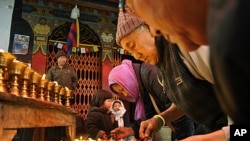Another young Tibetan monk has set himself on fire in Southwest China, in what Tibetan activist groups say is an increasingly unified campaign protesting Chinese rule.
The incident took place Monday in Ngaba county, a Tibetan-populated area of China's Sichuan province. Lobsang Gyatso, a 19-year-old monk at Kirti Monastery, is the second teenager to commit self-immolation in the last three days in the area, and the 23rd Tibetan to set himself ablaze in the past year.
View Related Gallery - Social Injustice Fuels Self-Immolation Protests
The Britain-based rights group FreeTibet reports that 200 protesters gathered Saturday in what had been a relatively peaceful area of neighboring Qinghai province known as Jyekundo county.
The group's director, Stephanie Brigden, said her organization receives daily notice of other incidents in the area.
"I think it would now be fair to describe that there is greater unity, that one protest is inspiring another protest, that Tibetans are free from fear," she said.
She added that Tibetans seem increasingly willing to defy authorities despite the risks of participating to public demonstrations.
Restiveness in Tibetan areas of China has spiked in recent months, with protests taking more public and drastic forms.
In response, the Chinese government has increased the deployment of security forces and cut off communication with some of the restive areas. Foreign journalists and human rights observers have been denied entry to the region, making it difficult to verify the situation independently.
"China is trying to censor the real story and Tibetans are risking lives to make sure that the world knows what is going on," Brigden said.
The Chinese government has likened self-immolations to terrorism, and has accused the Dalai Lama, the Tibetan spiritual leader, of encouraging such acts.
Earlier this month, a Tibetan was shot to death by Chinese forces while attending a protest in Draggo (Chinese name: Luhuo), another Tibetan area of Sichuan province. Those demonstrations, which Free Tibet says involved thousands of people, were triggered by arrests of Tibetans accused of distributing pamphlets calling for freedom in Tibet.
In that instance, Foreign Ministry spokesman Liu Weimin accused Tibetan organizations abroad, specifically the Tibetan Youth Congress, of masterminding the incidents.
"The Chinese government would resolutely crack down on any attempt to incite violence, disrupt national unity and territorial integrity," he said.
